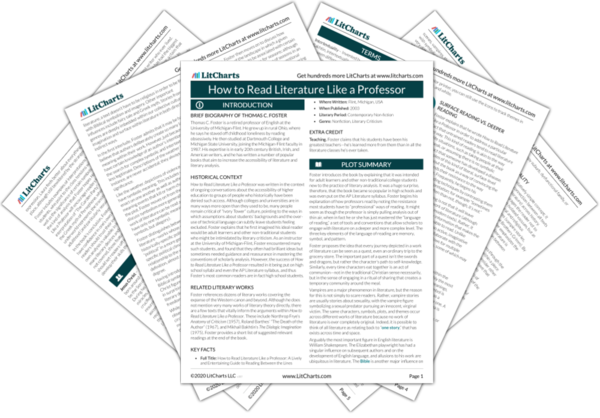Summary
Analysis
The dinner party described in Joyce’s “The Dead” may not at first appear remarkable to American eyes, but that’s because—like all subjective views—the American perspective is inherently limited. In the context in which the story is set, the meal is extremely remarkable, significant on the level of class, religion, geography, and so on. As readers, we all have our “blind spots,” which is fine; however, in order to understand a piece of literature well, we need to be able to inhabit it world—at least to some extent. The point is not to read with “your eyes,” or, in other words, not to read only from your own particular historical, cultural, and individual perspective.
Letting go of one’s own particular perspective is not a matter of familiarizing oneself with every possible cultural and historical context. Although that would probably help in understanding literature, it would be impossible and unnecessary. Rather, Foster encourages readers to try to relinquish their own judgments and meet a work of literature at its own level—meaning not trying to transpose the characters and events into the context with which the reader is familiar.
Themes
Foster uses the example of James Baldwin’s story “Sonny’s Blues” (1957), about an uptight math teacher whose brother is a heroin addict, to demonstrate how influential the reader’s point of view can be. The central question of the text is whether or not Sonny can be saved from the perils of addiction. Foster advises that, in order to do the text justice, readers must avoid approaching the story from the lens of contemporary scientific or sociological understandings of addictions. Instead, we must take the story on its own terms.
Another way to interpret Foster’s advice in this passage is as a reminder of his previous statement that “characters are not people.” Just as we shouldn’t remain too attached to our own cultural contexts and judgments, so too should we not react to characters in literature as if they were people we were meeting in real life.
Themes
The problem of adjusting perspective based on a given text is exacerbated when the text is very old. The Ancient Greeks, for example, believed it was honorable to slaughter people in battle and completely normal to own slaves. This does not mean that Homer should inspire us to pick up a sword ourselves, but that we shouldn’t be too quick to judge a civilization by standards that didn’t exist during its time.
If we were to apply our own contemporary moral standards to works of literature written in the past, there would be many works we couldn’t read without fuming. On the other hand, some critics argue that the attitude Foster outlines here is taken too far, and that we should be careful not to romanticize civilizations such as Ancient Greece, which were in fact very brutal.
Themes
Another example: Shakespeare’s The Merchant of Venice (1605) is certainly anti-Semitic from a contemporary perspective, but it was probably considerably less anti-Semitic than was usual within mainstream English culture at the time. On the other hand, Ezra Pound is a more recent and more troublingly anti-Semitic writer, who—to make matters worse—was writing in the lead-up to and during the Holocaust. Although Foster himself (along with many readers) still engages with Pound’s work, it is understandable that others choose not to.
As you might imagine, this is one of the most contentious issues in literary scholarship in the current moment. Some people argue that it is simply impractical, as well as unreasonable, to refuse to read the work of an author on the grounds that they were racist, sexist, or otherwise prejudiced. Others argue that this position inherently emerges from the perspective of those who have not had to face discrimination in their own lives.
Themes
Get the entire Read Like a Professor LitChart as a printable PDF.













